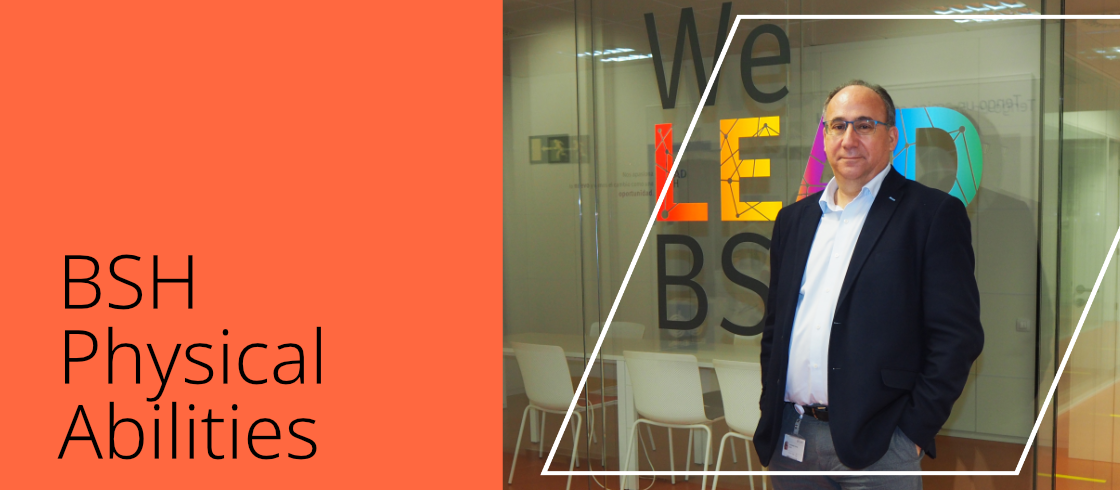Creating safe workplaces for colleagues with disabilities
Reading time for this article: 4 minutes
Working with a disability is a challenge and sometimes even impossible for people in many corporations. Lack of safe equipment and awareness hinders their inclusion. BSH Spain committed to bettering the situation and providing safer working spaces for the colleagues with disabilities. We asked Jesús Fernandez Tapias, Head of HR at BSH Spain, about the measures that were taken so far and the ones that are yet to come to foster Diversity, Equity and Inclusion.
BSH integrated special measures to make sure that colleagues with disabilities can work without any limitations safely in their working environment. Can you give us examples of such modifications and the process behind them? What is the feedback of the colleagues and their teams?
Every year, our health service staff performs a medical examination of the workers in our production plants. Depending on the results, we sometimes detect certain ailments that are not compatible with their jobs. These may be physical or sensory disabilities that have to be taken into account when placing workers in the different production processes. For example, a person with hearing disabilities cannot and should not work in facilities with high noise levels, or people with musculoskeletal disorders should not perform repetitive movements or handle heavy loads.
The optimization of the ergonomics of our production processes has evolved a lot in recent years. Today it is a factor that has the same weight or more than other decisions when designing our production processes. This ergonomic improvement is undoubtedly a highly appreciated factor within our workforce.
If you look at the current situation concerning the integration of colleagues with disabilities – what is going well and what needs to be improved?
Our health promotion programs, for example, with physiotherapists in the workplace, or physio coaching rooms have excellent feedback from our colleagues and are a preventive approach that works very well both to prevent disability and to alleviate ailments that may currently be occurring.
However, I think we still have some way to go in terms of raising awareness. We periodically launch awareness campaigns and carry out actions to let people communicate their disability, but the number of people who report their disability is not high, which leads us to believe that awareness is still one of our unresolved issues.
What actions and initiatives are planned next to provide further integration?
We want to continue working on raising awareness among our workforce and exploring ways to integrate a greater number of people with disabilities among our colleagues.
To ensure the integration of colleagues with disabilities, BSH Spain cooperates with organizations like the Association of Deaf People of Aragon.
Tell us more about the cooperation – how was this initiated, how do they support it?
More than 20 years ago, our plant in Montañana (Zaragoza, Spain) decided to welcome hearing impaired people in our production environments. This fact posed a challenge when it came to integrating and maintaining communication with this group, having simultaneous translators in the informative and training talks, having visual measures in our production centers, etc. The collaboration with the Association of Deaf People of Aragon was essential to have specialized support and recommendations to ensure that this integration is optimal.
Why is it important for companies like BSH to work on integrating people with disabilities?
Disability is more frequent than we think. Around 15% of people on the planet, more than a billion, live with it. Diversity offers teams inspiration, innovation, and involvement. Valuing all our colleagues according to their different skills is a priority. Their expertise, commitment, and motivation are key factors for a global organization such as ours.
So far, there is little awareness for the topic of accessible working places for people with disabilities – how can corporations and colleagues develop and foster this awareness?
First of all, it is an issue that begins with understanding the commitment that large entities such as ours have to make. Once there is this real willingness to do things, it is possible to carry out an infinite number of measures. In fact, the list never ends, because there will always be new technologies to implement, new needs to cover, etc. From training or awareness-raising for managers and other workers to teleworking, flexible working hours, or expert advice can be of great help to improve in this aspect.
What are your visions and wishes concerning the inclusion of colleagues with disabilities for the upcoming years?
Labor integration is a fundamental way to develop the skills of people with disabilities.
BSH Spain has as suppliers of materials or services different centers of social and labor integration, whose staff is mostly people with disabilities and in this way we manage to employ a high number of people with disabilities, however, internally we still have potential to further increase awareness and the number of people with disabilities who are directly part of our company.




